Highlights for the morning: Nvidia's megaproject, AI industry shortages and Tylenol issues

Nvidia announced the largest AI project in history with investments of up to $100 billion in OpenAI and the launch of 10 GW of computing power comparable to millions of GPUs. Against this backdrop, Bain & Co. forecasts an $800 billion revenue shortfall for the industry by 2030: to cover infrastructure costs, companies must generate $2 trillion a year, but so far monetization of services has lagged behind costs. These and other topics are covered in our review of key events for the morning of September 23.
Nvidia will invest $100 billion in OpenAI for the largest AI project in history
Nvidia shares jumped nearly 4% after announcing an investment of up to $100 billion in OpenAI, Yahoo Finance writes. The partnership calls for the launch of "at least 10 gigawatts" of computing power based on the new Vera Rubin platform in the second half of 2026. By comparison, Meta's largest project in Louisiana is designed for only 2 gigawatts. CFRA estimates that the plan will require up to 5 million Nvidia GPUs.
The deal with OpenAI is part of Nvidia's massive expansion into AI infrastructure. A week earlier, the company acquired a $5 billion stake in Intel, signed a $6.3 billion agreement with CoreWeave and announced plans to deploy tens of thousands of chips in the UK. CEO Jensen Huang called the new project "the largest in the history of artificial intelligence."
Analysts note that Nvidia is effectively becoming the "investor of last resort" for OpenAI, whose obligations to lease capacity from Oracle and CoreWeave are estimated at hundreds of billions of dollars. Despite doubts about the sustainability of such investments, the growth of Nvidia's investments confirms the real demand for AI infrastructure, the publication points out.
Bain has warned of a revenue shortfall in the AI industry by 2030
Artificial intelligence companies will need $2 trillion in annual revenue by 2030, according to Bain & Co. estimates, to cover the cost of computing power and infrastructure, Bloomberg writes. However, current revenue forecasts indicate a shortfall of about $800 billion: the growing popularity of services like ChatGPT from OpenAI and Gemini from Google is not keeping pace with the cost of data centers and energy.
The largest technology corporations - Microsoft, Amazon and Meta - are already preparing to increase annual spending on AI to $500 billion at the beginning of the next decade. According to Bain's calculations, the global demand for computing power may reach 200 gigawatts, half of which will fall on the United States. At the same time, bottlenecks in supply chains and energy shortages could slow progress, despite possible technological breakthroughs.
In addition to infrastructure, companies are actively investing in the development of autonomous AI agents, as well as in new areas like quantum computing and humanoid robots. Bain estimates that quantum technologies could unlock up to $250 billion in market value in finance, pharmaceuticals and logistics in the coming years, while the success of robots will depend on the readiness of the ecosystem and pilot implementations.
Trump linked Tylenol to autism despite scientists' objections
Donald Trump's administration has announced a possible link between acetaminophen (Tylenol) and the risk of autism when taken during pregnancy, CNBC writes. The FDA is preparing a warning for doctors and plans to change the labeling of the drugs. The Department of Health under the leadership of Robert F. Kennedy Jr. will launch a campaign to inform the public and recommended the use of minimal doses of the drug only in acute need.
Trump and Kennedy's statements drew sharp criticism from the scientific community and manufacturer Kenvue, which emphasized that acetaminophen remains the safest pain and fever remedy for pregnant women. Doctors warn: quitting or substituting the drug may pose a greater risk to the Ma and baby. Studies also show that fever itself is dangerous and can lead to complications.
At the same time, the FDA approved an expanded indication for leucovorin, a drug previously used to treat folate deficiency. It can now be prescribed to children with autism with proven improvements in speech and social skills, although the drug is not considered a full treatment. Experts emphasize that the causes of autism are complex and it is incorrect to reduce them to one factor - whether it is medication or vaccines.
The Supreme Court has allowed Trump's firing of an FTC member to stand
The U.S. Supreme Court on Monday allowed Donald Trump to temporarily remove Rebecca Slaughter as commissioner of the Federal Trade Commission (FTC) while a presidential probe is underway, CNBC reports. The decision came by a six to three vote, despite lower courts citing a 1935 precedent (Humphrey's Executor) that prohibits the president from firing members of independent agencies without good cause.
The justices will now consider whether that precedent should be revisited and whether the courts have the power to prevent the president from firing officials at all. The hearing is scheduled for December. If the decision is reversed, the president will have direct control over the work of independent commissions like the FTC.
The liberal justices, led by Elena Kagan, dissented, saying the majority "cedes complete control to the president" and destroys agency independence. As long as Humphrey's Executor remains in place, she said, Congress has clearly limited the power of the chief executive, and the Supreme Court should not expand it through emergency decisions.
What's in the markets
- Japan's broad Topix index was up 0.5 percent.
- The benchmark Nikkei 225 was up 1%.
- In South Korea, the Kospi index was adding 0.5%, while the Kosdaq small-company index was falling 0.6%.
- Australia's S&P/ASX 200 was up 0.5 percent.
- Futures on the S&P 500, Nasdaq 100 and Dow Jones Industrial Average were little changed.
This article was AI-translated and verified by a human editor
